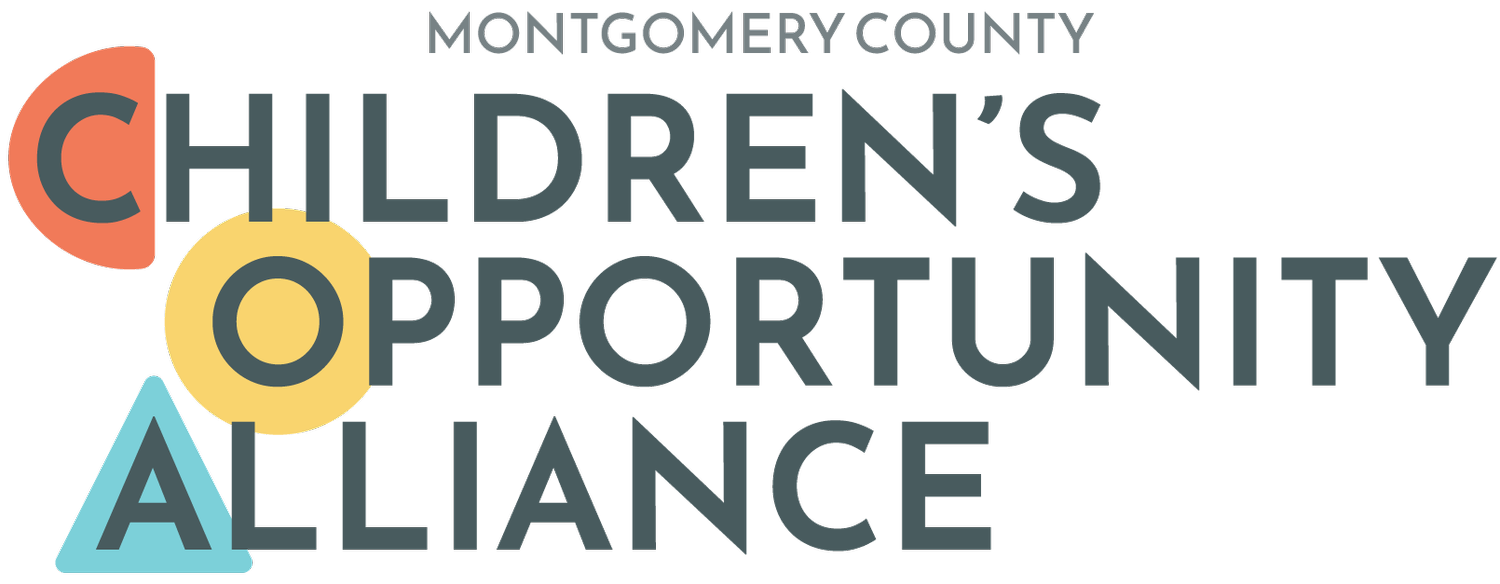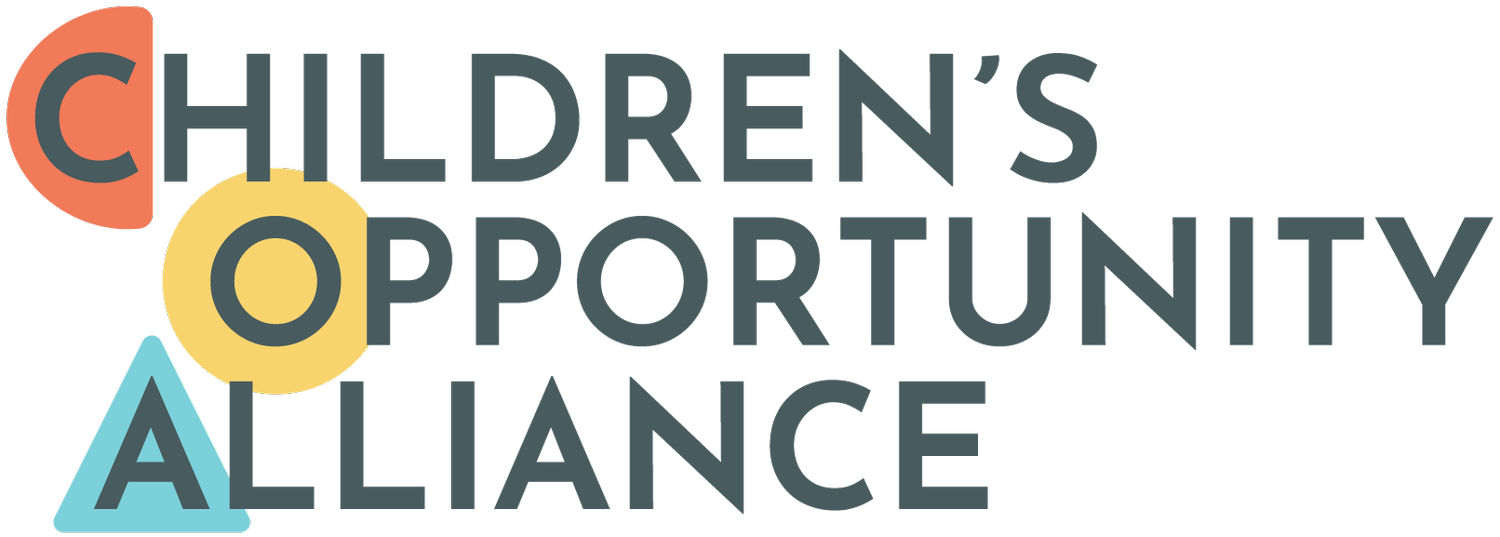The Sandbox: Unpacking Kindergarten Readiness
MAY 2025
I met a mom last year in Montgomery County with a two-year-old son, and they were living in a shelter while she drove for DoorDash. She was concerned for her child’s development – he had a speech delay, and she was unable to secure affordable child care. With the help of a state subsidy, she was able to enroll her son in full-time care, which, in turn, allowed her to find more sustainable employment. Now, her son has access to the early interventions he needs so that he’s ready to thrive in Kindergarten.
As this school year draws to a close, I’m thinking of the parents and caregivers across the County who face uncertainty about their child’s future. We know that early education is critical for future success, and parents and families frequently hear references to “Kindergarten readiness” from teachers and pediatricians – but what does it actually mean?
What is Kindergarten Readiness?
Kindergarten readiness refers to whether a child has demonstrated they have the necessary skills to succeed in Kindergarten across key domains of development: language/literacy, math, social foundations, and physical well-being. Children who come to Kindergarten prepared have better outcomes in school and life – they have better third grade reading scores, they are more likely to graduate high school, and they even have higher wages as adults. The learning that happens in the early years, starting from birth, is the key to being ready for success in Kindergarten and beyond. The Montgomery County Early Care and Education (ECE) Common Agenda seeks to ensure that all children arrive to Kindergarten ready to learn and thrive.
In Maryland, Kindergarten readiness has historically been measured by the Kindergarten Readiness Assessment (KRA), administered to all incoming students during the first weeks of school. Readiness scores reflect both individual development and access to and the quality of early learning environments – making them a reliable indicator for how well the ECE system is serving young children. We know that high-quality early care and education lay the foundation for children’s cognitive, social, and emotional development, and children who attend high-quality early learning programs are more likely to demonstrate readiness. In fact, gaps in Kindergarten readiness often mirror inequities in the ECE system.
Graphic adapted from BUILD Initiative
Of course, Kindergarten readiness doesn’t exist in a vacuum. It’s the result of a culmination of many systemic variables. The BUILD Initiative’s early childhood system framework helps us think about key factors influencing Kindergarten readiness:
Early Learning: Children have access to high-quality early learning experiences in the home environment, in community settings, and/or in formal early care and education settings.
Family Supports: Parents and other caregivers have the knowledge and skills to support their child’s needs.
Physical Health, Mental Health, and Nutrition: Children have access to comprehensive care that maximizes their physical and emotional health.
Supports for Economic Self-Sufficiency: Children and their families have access to basic needs, such as healthy food and stable housing, and are not living in constant stress.
Why Does This Data Matter?
Tracking Kindergarten readiness allows us to assess whether efforts to strengthen the ECE system are leading to better outcomes for children. At the Alliance, we believe that this data, when used appropriately, can be a powerful tool for informing systems change. The Common Agenda Dashboard makes Kindergarten readiness data accessible and understandable to the community. It shows trends over time and by key demographic groups, helping us track progress toward our equity goals. It helps Alliance partners see where to focus efforts and resources, and it helps us stay accountable and work collectively toward systems change. The data can be disaggregated by race/ethnicity, income, language, and geography, helping identify disparities and target supports where they are most needed.
Of course, like all data, Kindergarten readiness data has limitations. A 2023 study commissioned by the Maryland State Department of Education found evidence of implicit racial bias in how the KRA scores are interpreted – particularly that multilingual children are less likely to be rated as “demonstrating readiness,” even when other factors are held constant (MSDE to Adopt New Kindergarten Assessment for School Readiness). However, Kindergarten readiness is one of the few consistent, population-level indicators available that can tell us how well early childhood systems are supporting children’s development.
What’s Next?
The Common Agenda planning process prioritized the factors impacting Kindergarten readiness that the Alliance is best-suited to take the lead on influencing: ensuring that children and their families have access to resources, primarily within early learning and family supports. The health and economic self-sufficiency areas are also critical to meeting our goal, and we are seeking to support partners in taking a leadership role in implementing strategies that improve outcomes for young children. There are many family-serving systems – such as housing, economic development, transportation, and food – that are not generally considered to be under the umbrella of the ECE system, yet we know that these interconnected systems can create opportunities or barriers for young children and their families. Over time, the Alliance hopes to develop stronger partnerships and influence in these areas. If you want to get involved, consider joining one of our working groups to help move this critical work forward.
Everyone in Montgomery County has a role to play in making it a place where all children can thrive. Here are some quick actions you can take today:
Send an email or call your elected representatives to tell them that you care about investments in early childhood. Find contact information for Montgomery County Councilmembers.
Ask your employer what they are doing to support employees with young children. Consider sharing some ideas with them.
Tell a friend about the early childhood resources we have in Montgomery County – including LOCATE to help find child care, Imagination Library to get free books, and the BASICS program tips and resources for parents through text messaging and a newsletter – and so much more.


